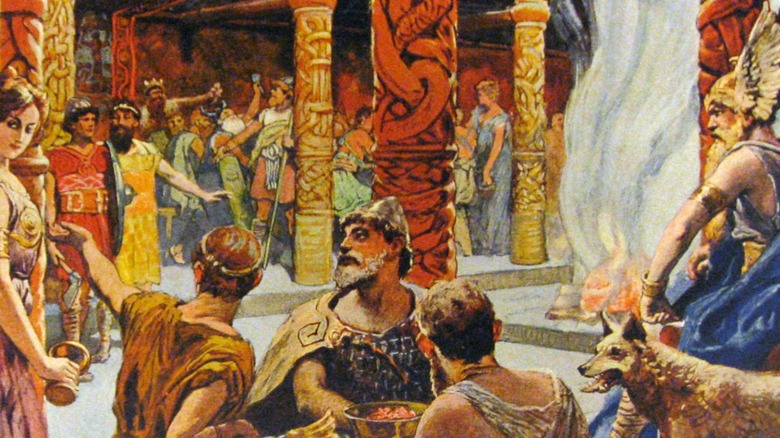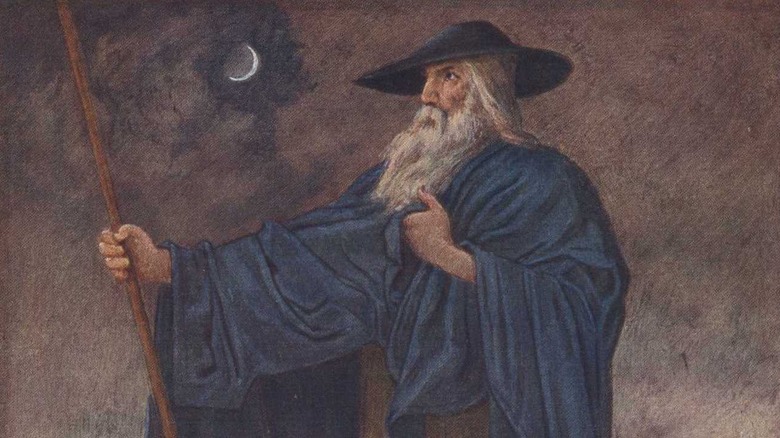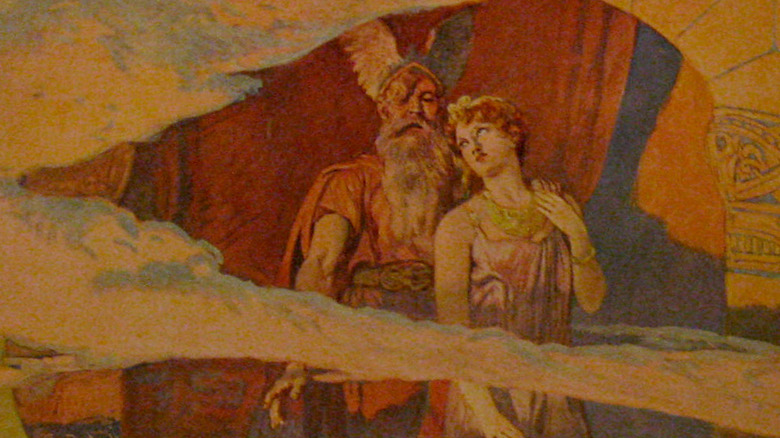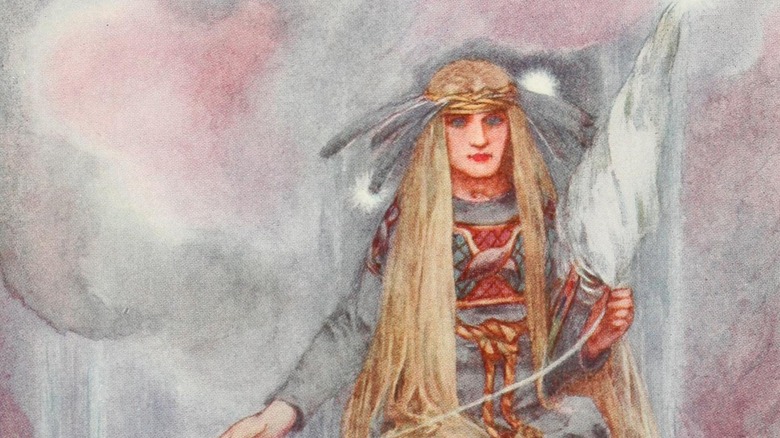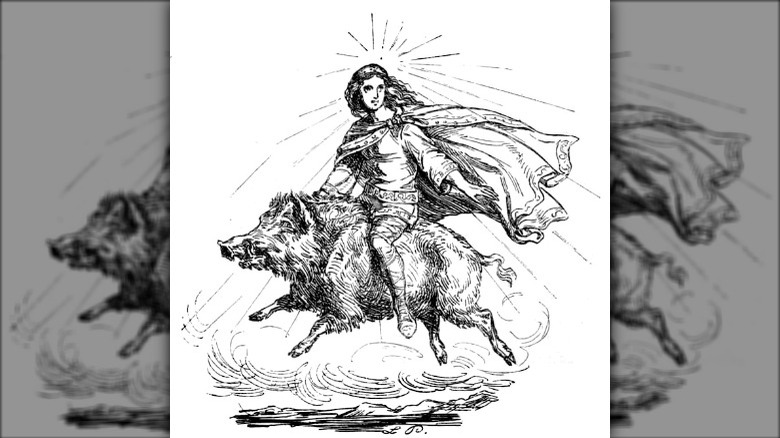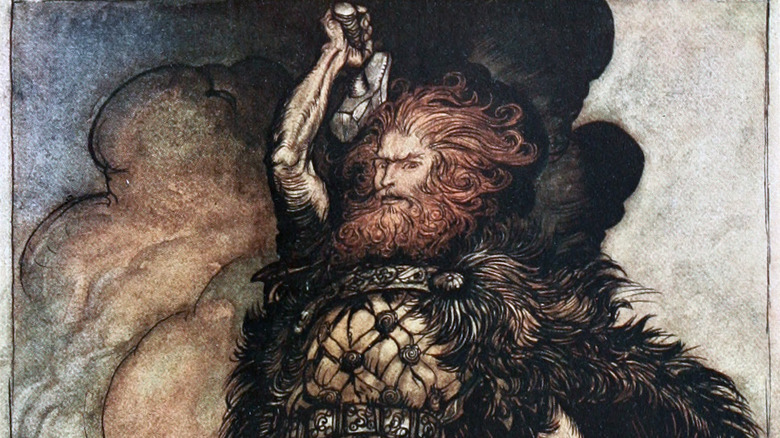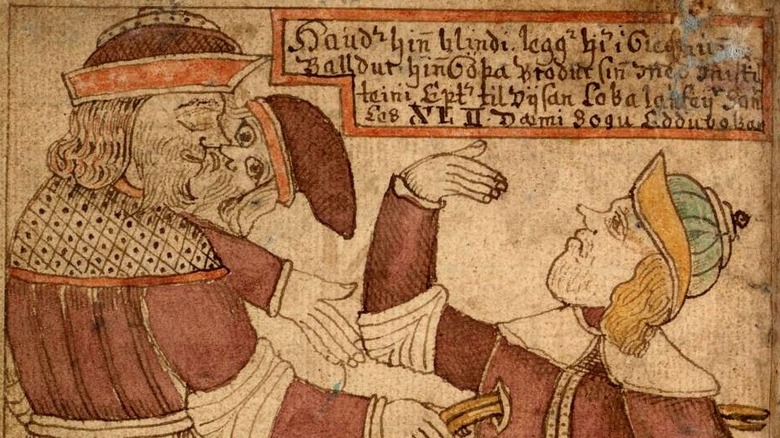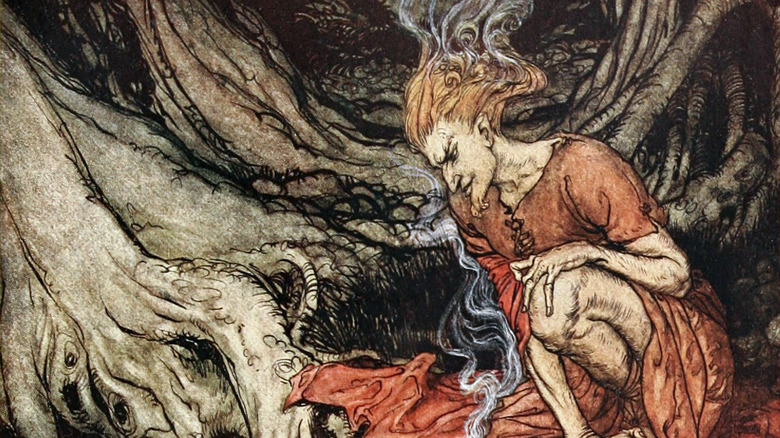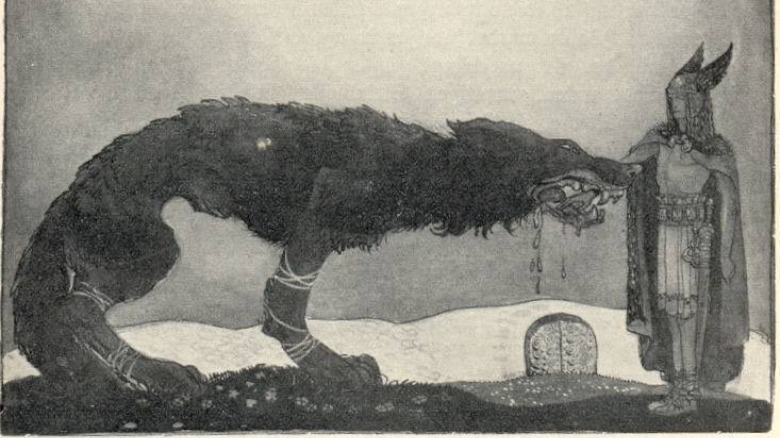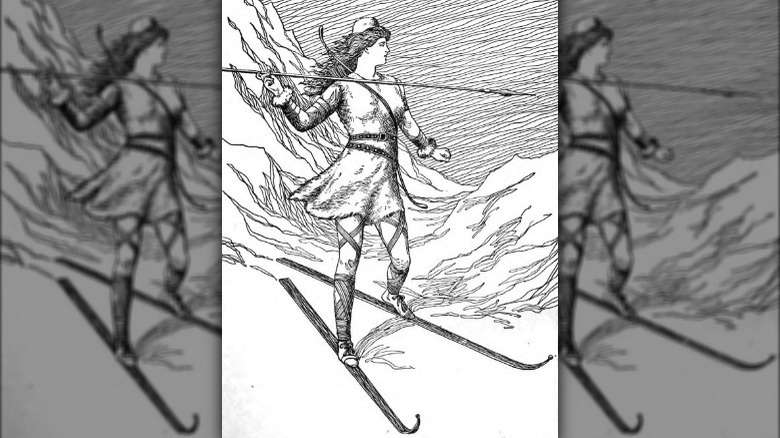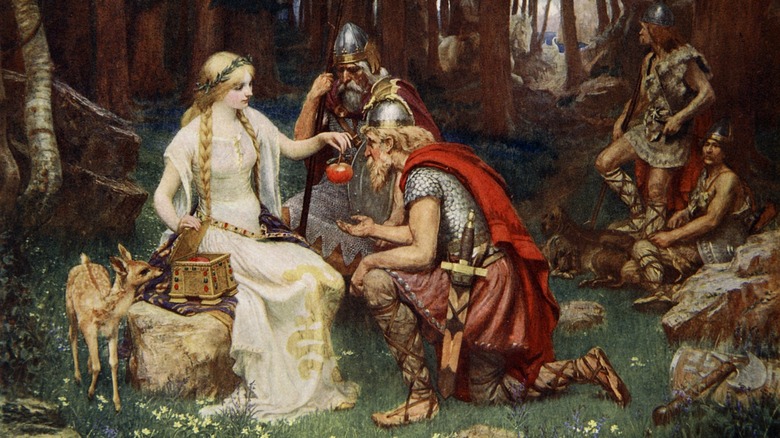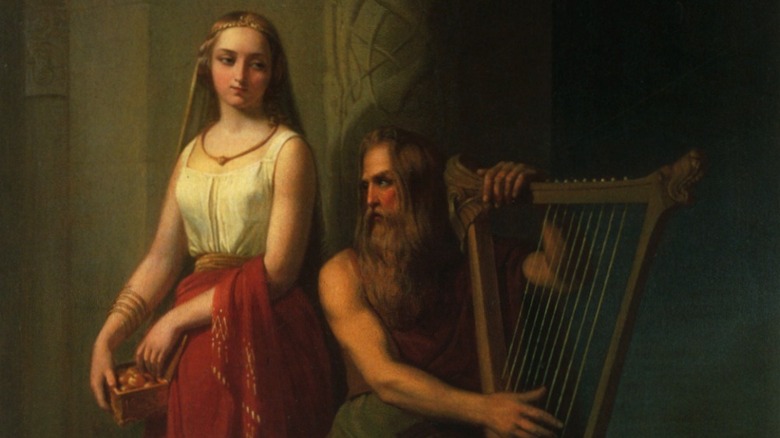Norse Mythology's Most Important Gods And Goddesses
It's easy to get pretty mixed up in the world of Norse mythology. It's not just that there's a certain blockbuster multi-movie franchise out there that can really confuse things when it comes to deities like Thor and Loki. It's also the fact that there are a pretty wide variety of gods and goddesses in the mix. What's more, some of their realms and responsibilities tend to overlap (just go ahead and ask all the fertility gods to raise their hands and you'll see). What's more, given the fact that the Norse people weren't really on top of writing down their cultural and religious beliefs for much of their history, it's hard to track things down.
As the BBC notes, what was written is oftentimes pretty fragmentary and may not be entirely reliable. The Icelandic sagas, our most complete source for Norse religious belief, were written down in medieval times by Christian authors who didn't always cast a kind eye on their ancestors' pagan beliefs.
So, if you're trying to get a settled list of Norse deities and what they got up to, you're not in much luck. However, we do have a cast of characters that take part in a few core stories. Along with other bits of evidence, like rune stones, it's just enough to figure out who the main players were. These are some of Norse mythology's most important gods and goddesses.
Odin
When you're talking about a pantheon of ultra-powerful deities, it's usually a good idea to start with the biggest one. You don't want to offend any significant personages, after all. And when it comes to Norse mythology, it's hard to pretend that anyone is at the head of hierarchy other than the ultra-wise, one-eyed All-Father himself, Odin.
That's not to say that Odin was always the big guy in charge. According to "Norse Mythology," Odin was known to have parents and grandparents, though, in many myths, he's also a creator god. Odin helped to create our current reality with two of his brothers after the trio killed a giant named Ymir and used his body as the basis for the cosmos. Odin fathered a few gods himself, including the hammer-wielding Thor, and is known for his great wisdom.
That wisdom goes far beyond giving really good advice, however. As "World Mythology" notes, Odin was often revered as a deity of magic. In his mythological story, Odin gains his vast knowledge and divinatory knowledge through semi-sacrificing himself on Yggdrasil, the world tree. That sacrifice included not only allowing himself to hang on the tree, but also giving up one eye — hence the common depiction of him as a one-eyed man. However, his vast power also allowed him to change form, meaning that the stupendously powerful and wise All-Father could just as easily be a raven as the old one-eyed man you passed on your travels.
Frigg
Too often, the divine wives of major gods are dismissed. Take Frigg, also sometimes known as Frigga, who is frequently discussed in passing as Odin's wife and little else. But don't let bad translations or summaries fool you. Frigg is a pretty big deal.
How big of a deal? According to the World History Encyclopedia, she's a fertility goddess who also deals quite a lot in the realm of foretelling the future. Yet, curiously enough, she doesn't show up in a lot of the classic tales of Norse mythology. Even though she rarely has a starring role in narrative retellings of the Norse gods and goddesses, you can't deny her power, especially as it's referenced in the bits and pieces we have of Norse religious rites.
Even Odin, who you might think is the only one who might be casual about Frigg's role, clearly respects her. He'd have to, really, given that Frigg is known to have outsmarted even the all-seeing, all-wise All-Father. On one occasion, she arranged for a group of humans she favored, the Winnili, to gain the upper hand in a conflict. Odin promised that he would grant it to whomever he saw assembled first thing in the morning. Frigg, apparently wanting to boost her side's numbers, instructed the women of the tribe to join in, with their long hair arranged about their faces to look like beards. With a little bit of such flair, Frigg easily won the day.
Freya
It's rather easy to get Frigg and Freya mixed up, given that both are known as fertility goddesses. Given some of that overlap, a few scholars believe that the two goddesses may share the same religious roots in the distant, poorly recorded Norse past (via World History Encyclopedia). Today, Freya (also spelled Freyja) is arguably most often recognized as the Norse pantheon's main fertility goddess, known for her beauty and romantic nature. At the same time, the Swedish History Museum reports that she's also a good resource for prophecy and even has a hand in the bloody Norse business of war.
For all her foresight and battle readiness, Freya's most often known as a lovely fertility goddess, per the World History Encyclopedia. She also has a chariot that's delightfully pulled by cats. That may be useful for getting away from all of the personages in Norse myth who are drawn to her beauty, including a giant who steals Thor's hammer and only agrees to give it back if Freya marries him. She skirts the deal, in part because Loki comes up with a plan where Thor will impersonate the goddess instead.
Perhaps people should just be nicer and try to get to know her instead, as Freya is sometimes described as a goddess of treasure. In some stories, she can even cry tears made out of gold, meaning that it's probably far more lucrative to be her friend than a potential abductor.
Freyr
We often like to think of the Norse as Vikings only, descending upon settlements to raid and conquer to their hearts' content. But the truth of the matter is that there were quite a few Norse people who had nothing to do with violent takeovers or even much exploration. In fact, as History notes, "Viking" doesn't really refer to a specific ethnic or cultural group so much as a bunch of people from a broad region who wanted to go raiding together.
For the more peaceful Norse folk, life was all about sustaining themselves and their community with agriculture. And in those contexts, the god Freyr was a seriously big deal. Like his twin sister Freya, Freyr was also a fertility deity, this time connected most obviously with the land and crop production (via World History Encyclopedia). Ultimately, Freyr is less interested in making romantic connections than he is making sure that the barley crop comes in well this year.
According to "World Mythology," Freyr was also helpful in matters of divination and was connected to funeral rituals for Swedish kings, who may have been believed to take on some of Freyr's agricultural powers themselves when they were buried in the ground. Because he's linked to ship imagery on occasion, he may have also been connected to some of the more spectacular Norse and Germanic ship burials uncovered in Scandinavia and beyond.
Thor
You may think you've got Thor on lock. You know, a big, blond guy with a similarly big temper, one who often carries a huge hammer with magical properties and who can summon thunder and lightning. But let's step away from the blockbuster movies for just a minute. Are you sure that what you've seen on screen truly reflects the god worshipped by so many Norse people centuries ago?
Of course, as you may have already guessed, there are some pretty significant differences between Norse mythology and what's made it to screen. First, per "A Dictionary of World Mythology," Thor didn't just have a hammer. He also had a pair of iron gloves and a belt that would increase both his size and strength. He isn't just a god of thunder, but also of the sky and weather in general (with a bit of fertility thrown in there, too, since the Norse seemed very focused on that particular topic).
"Thor: Myth to Marvel" also notes that the mythological Thor is married to the goddess Sif and, together, they have two sons and a daughter. But, in certain cultures like that of Iceland, he's actually a redhead with quite a bit of bluster who admittedly isn't the most intellectual of the gods. To his credit, however, he's also continually defending his fellow Norse deities and doing his best to secure the stability and safety of their realm (via "Thor") — Ragnarok notwithstanding, anyway.
Baldr
Though we can be pretty certain that Norse worshippers generally revered their favorite goddesses or gods, even they must have had to admit at some point that there was a golden boy they just couldn't ignore. Like the prom king or best in class, there was one who stood out as a truly special boy: Baldr.
Baldr (whose name is also often spelled as Balder or Baldur) was the son of Odin and Frigg, according to the Swedish History Museum. Pretty much everyone loved him, but that didn't stop Baldr from having a chilling dream of his own death. Frigg went about gathering promises from nearly everything in the world that it would not harm her precious son. Only, nearly everything wasn't quite enough. She ignored the seemingly harmless mistletoe.
Loki didn't, however. And tricky Loki, as you may well already know, was one of those gods who just can't stand to let everyone else be happy or acclaimed, even if it's Norse mythology's best boy ever. So, he not only fashioned an arrow out of the mistletoe, but then instructed Baldr's blind brother Hodr to throw the weapon in Baldr's direction. It may have seemed innocuous enough, since the gods had made a game out of throwing weapons at the apparently invincible Baldr. But the mistletoe proved deadly, and even the efforts of the gods to bring him back from the underworld proved fruitless. Thanks, Loki.
Loki
No, Loki's not really a god of mischief, as academic Karl E.H. Seigfried points out. That's more rightfully the work of modern researchers who have linked Loki to trickster figures in other traditions, but we can't be reasonably sure that the Norse viewed him as such. And, no, he wasn't a god of fire, nor do we know why he was such a colossal jerk in Norse mythology that he helped to bring about the end of the gods in Ragnarok. In fact, it's not really clear that Loki was even worshipped in the same way that other gods like Frigg or Freyr were.
Yet, Loki definitely shows up in Norse myth, and oftentimes in pretty key roles. The World History Encyclopedia says that he was Odin's "sworn brother." In fact, he often shows up to save the other gods from themselves. Consider the wild tale where he turns himself into an attractive mare to distract a builder's horse, getting the gods a great deal on a construction project and bearing a magical eight-legged steed for Odin in the process.
It could be that Loki was a later addition to the canon, given that he's far more prominent in later sources like the 13th-century "Prose Edda," written and compiled by Icelander Snorri Sturluson. But this shape-shifting figure, who's not above throwing down insults against even the biggest of the other gods, has certainly captured our modern imaginations.
Tyr
Though it's clear that the Norse weren't always about war, neither can we escape the fact that quite a few of them wreaked havoc across Europe and beyond as Vikings. As in so many other societies throughout history, war was inevitably part of the Norse way of life.
Therefore, it's no surprise that there's a Norse god of war. What is surprising, however, is the fact that we don't have a ton of information about him. The deity in question is Tyr, who may have once had a much bigger role. According to "A Dictionary of World Mythology," Tyr could have been an earlier Germanic god who had domain over the entirety of the sky. Some sources even refer to him as Odin's son. Eventually, Tyr seems to have been knocked down a peg and was set in charge of making war.
Perhaps one of the best known stories about Tyr explains how he lost a hand. Per the World History Encyclopedia, the gods became nervous about Loki's monstrous children, whom he had sired with a giantess. One of them, Fenrir, was a humongous wolf that showed signs of growing even larger. The gods decide to chain up the wolf-child but can only do so if someone puts their hand in Fenrir's mouth to convince him of their (ultimately false) good faith. Tyr volunteers and, when Fenrir realizes he's well and truly struck, he bites the war god's hand clean off.
Skadi
Giants in Norse mythology occupy something of a gray area between humanity and the gods. Some, however, have made the transition from mythical being to outright deity, like Skadi. According to the "Encyclopedia of Goddesses and Heroines," she was originally a giantess who traveled to Asgard to avenge her father's death. Turns out that Skadi is pretty formidable, to the point where even the Norse gods had to back off and try to appease her rather than defeating the angry giantess outright. Loki manages to make her laugh by tying himself to a goat, which starts things off right.
Part of the deal also involved selecting a husband from amongst the gods. The blindfolded Skadi selected Njord, god of the sea, but the two weren't well suited to each other and eventually separated. Ultimately, Skadi seems to have taken up with Ullr, a relatively minor god in charge of skis. It may seem like a small thing, but Skadi (whose name reportedly is linked to "Scandinavia") apparently makes good use of those skis as she makes her way through the snowy wilderness.
Despite the romantic issues, Skadi seems to have done pretty well for herself as a goddess (a title she gained in part because of her marriage and other associations with the Norse gods). The Swedish History Museum reports that she was eventually known as a goddess of the wilderness who can sometimes be seen skiing through the mountains as a fierce hunter.
Idunn
Upon first glance, Idunn may not seem all that important. She's yet another fertility deity in a pantheon that's already pretty packed with them. She's known for being in charge of some apples. That's about it.
But don't let that fool you, as those apples aren't just any regular fruits plucked off a tree. Per the World History Encyclopedia, these are apples that help the gods to maintain their long lives. Without them, chances are good that the various Norse deities would age and die just like any other folk. In some interpretations of her mythology, it's the goddess herself who keeps the others young and healthy, just by being around. Either way, it pays to be respectful to Idunn.
It also makes sense that the gods are pretty invested in her wellbeing. So, when she's abducted, it's natural that they go to great lengths to save her and those precious, precious apples in her charge. In one version of the story, Loki and some other gods anger a magical eagle, who only agrees to let them go if they give him Idunn. Loki tricks her into meeting up with the eagle in order to save his own skin, but he's eventually obliged to get her back in order to keep the peace with the other gods.
Bragi
What's life without at least a little poetry? And, really, if it weren't for a decent storytelling tradition that was eventually translated into literature, we might know next to nothing about the ancient goddesses and gods of the Norse folk. With that in mind, we can't easily dismiss the Norse god of poetry, Bragi.
At least, he's the god of poetry in the mythology as related by medieval writer Snorri Sturluson, says the "Handbook of Norse Mythology." He features prominently in the "Lokasenna" poem, where Loki essentially gets drunk, crashes a party, and spends much of his time there insulting the other gods. When it comes to Bragi, Loki says that the deity is really just a coward, calling him "the most wary of battle / and most shy of a shot."
Loki really should be nicer, though, given that Bragi is the husband of Idunn, who herself manages the youth-granting apples so beloved by the gods (via Encyclopedia.com). And it's not as if Loki himself was known to charge headlong into battle himself. What's more, Bragi may have also been a real person. Some researchers believe that he may be based on a ninth-century Norwegian poet named Bragi Boddason. As a well-regarded literary performer in a culture that greatly valued such artistic figures, it wouldn't be all that surprising if the real-life Bragi filtered down through the ages and became somewhat deified himself.
